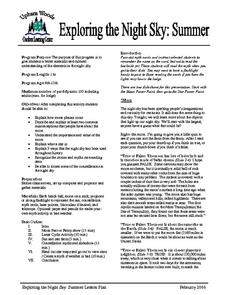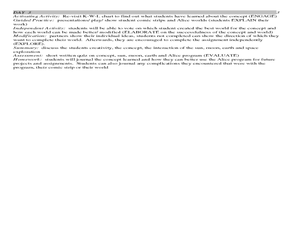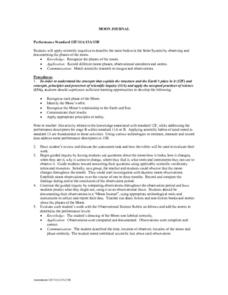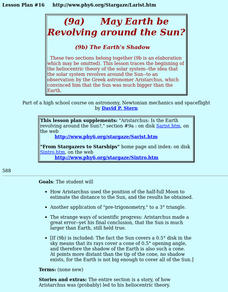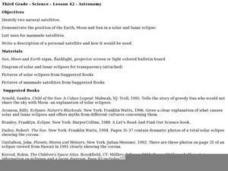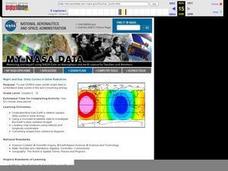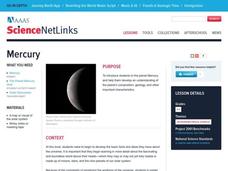PBS
Why Isn't There an Eclipse Every Month?
Searching for an eclipse activity that sends scholars over the moon? Try an interesting interactive to get their minds active! The resource, part of an extensive Space series from PBS Learning Media, uses modeling and data analysis to...
Curated OER
Exploring the Night Sky: Summer
Young scholars explain how moon phases occur. They describe and explain at least two common misconceptions that people have about the moon. Students explain what a star is. They explain 3 ways that the night sky has been used throughout...
Curated OER
Lunar Lollipops
Young scholars simulate the phases of the moon using a lamp and styrofoam balls. In this lunar phases lesson, students stand around a lamp and act as Earth. They hold styrofoam balls and rotate to show the phases of the moon.
Curated OER
Facts and Myths about our Solar System
Sixth graders explore popular ideas about the Sun and Moon. In this space science instructional activity, 6th graders separate commonly accepted details about our solar system into facts and myths. Students research a particular idea and...
Curated OER
Moon Journal
Fourth graders observe Moon and its features, and record results both in written form and in a drawing on the given template.
Curated OER
Our Place in Space
Third graders identify the different planets that make up the solar system. In this space science lesson plan, 3rd graders construct a scale model of the major planets. They explore their different unique features and dress up as planets.
Curated OER
Space Science: Journey Through the Solar System
Students explore the Solar System and examine the characteristics of al the planets. Through research and discussion, they create catalogs of the Solar System's components. Next, students use their findings to create Powerpoint...
Curated OER
The Path of the Sun: The Ecliptic
Students investigate the celestial sphere and the paths it takes in the solar system.
Curated OER
May The Earth Be Revolving Around The Sun?
Students trace the beginning of the heliocentric theory of the solar system--the idea that the solar system revolves around the Sun--to an observation by the Greek astronomer Aristarchus, which convinced him that the Sun was much bigger...
NASA
Feel the Heat
Pupils examine how solar energy can supply power and heat on the lunar surface. As groups design and build a solar-powered water heating system, they test their system to determine the change in temperature of the water and redesign it...
Curated OER
Science - Lesson 42 - Astronomy
Third graders demonstrate the position of the Earth, Moon, and Sun in a solar and lunar eclipse. They list uses for manmade satellites and write a description of how a satellite would be use.
Curated OER
Exploring the Night Sky: Fall/Winter
Learners explain how moon phases occur. They explain three ways that the night sky has been used through history. Students locate some of the constellations in the night sky. They discuss stories and myths surrounding stars.
Curated OER
Lunar Language
Students use a Lunar Language Graphic Organizer to draw and describe the phases of the moon. They explain patterns of changes in the appearance of the moon as it orbits Earth.
Curated OER
Astronomy
Students explore space science by utilizing education software. In this moon cycles lesson, students discuss the importance of the moon and the different phases we observe from earth. Students demonstrate the earth's orbit by creating a...
Alabama Learning Exchange
Planetary Cereal Project
Sixth graders decorate an empty cereal box with information and games showing their comprehension of factual information about an assigned planet. This is a nice, creative lesson about the solar system.
Curated OER
Comets
Students explore the nature and composition of a comet. They research comet facts, legends, and myths. They identify different types of comets and describe what happens to a comet as it travels closer to the Sun.
Curated OER
Inner Planets
Students create a booklet about the inner planets after researching the characteristics of each planet. Students research the following items for each planet: moons, size, rotation, orbit, atmosphere, an interesting fact. Their final...
Curated OER
Finding Out About the Stars and Planets
Students complete a web-based activity to study the planets and solar system. Students complete a number of activities including a slide show that depict the true facts about planets.
Curated OER
Sky Watching
Students complete night-sky observations to understand how our knowledge of the sky has been enhanced by telescopes. Students complete a timeline worksheet giving the history of telescopes. Students then then make their own observations...
Curated OER
NIGHT AND DAY: DAILY CYCLES IN SOLAR RADIATION
Students examine how Earth's rotation causes daily cycles in solar energy using a microset of satellite data to investigate the Earth's daily radiation budget and locating map locations using latitude and longitude coordinates.
PBS
Experience a Solar Eclipse
Didn't catch the last solar eclipse? Now every day can be eclipse day, thanks to an interactive lesson plan from PBS' Space series for middle schoolers! The well-rounded multi-media experience includes video clips, an interactive, and...
Curated OER
Mercury
Learners study the planet Mercury and develop an understanding of the planet's composition, geology, and other important characteristics. They explore a Web resource on the planet Mercury which is the central focus of this lesson.
Curated OER
As the World Turns
Third graders read books and participate in class discussions about the motion of the stars and planets and moons in relation to the Earth. In small groups, 3rd graders act out these movements to music.
University of Colorado
Space Travel Guide
Neptune takes 164.8 Earth years to travel around the sun. In the fifth of 22 lessons, young scientists create a travel guide to a planet in our solar system. They provide tips for others on what to bring, what they see, and their...



